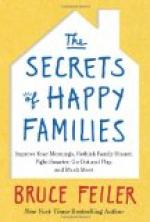A slim little man in blue serge, a man with the complexion of a strip of rawhide and the mustache of a third-rate orchestra leader, felt his way gingerly down by the light of the brakeman’s lantern, hesitated and then came questioningly toward them, carrying with some difficulty a bulky suitcase.
“It’s him, all right,” muttered Pink while they waited.
The little man stopped apologetically before the group, indistinct in the faint light from the office window. Already the train was sliding away into the dark. “Pardon,” he apologized. “I am looking for the U fich flies.”
“This is it,” Weary assured him gravely. “We’ll take yuh right on out to camp. Pretty dark, isn’t it? Let me take your grip—I know the way better than you do.” Weary was not in the habit of making himself a porter for any man’s accommodation, but the way back to where they had left the horses was dark, and the new cook was very small and slight. They filed silently back to Rusty Brown’s place, invited the cook in for a drink and were refused with soft-voiced regret and the gracious assurance that he would wait outside for them.
Weary it was, and Pink to bear him company, who piloted the stranger out to camp and showed him where he might sleep in Patsy’s bed. Patsy had left town, the Happy Family had been informed, with the declaration often repeated that he was “neffer cooming back alreatty.” He had even left behind him his bed and his clothes rather than meet again any member of the Flying U outfit.
“We’d like breakfast somewhere near sunrise,” Weary told the cook at parting. “Soon as the store opens in the morning, we’ll drive in and you can stock up the wagon; we’re pretty near down to cases, judging from the meals we have been getting lately. Hope yuh make out all right.”
“I will do very nicely, I thank you,” smiled the new cook in the light of the lantern which stood upon the fireless cook-stove. “I wish you good-night, gentlemen, and sweet dreams of loved ones.”
“Say, he’s a polite son-of-a-gun,” Pink commented when they were riding back to town. “’The U fich flies’—that’s a good one! What is he, do you thing? French?”
“He’s liable to be most anything, and I’ll gamble he can build a good dinner for a hungry man. That’s the main point,” said Weary.
At daybreak Weary woke and heard him humming a little tune while he moved softly about the cook-tent and the mess-wagon, evidently searching mostly for the things which were not there, to judge from stray remarks which interrupted the love song. “Rolled oat—I do not find him,” he heard once. And again: “Where the clean towels they are, that I do not discover.” Weary smiled sleepily and took another nap.
The cook’s manner of announcing breakfast was such that it awoke even Jack Bates, notoriously a sleepy-head, and Cal Emmett who was almost as bad. Instead of pounding upon a pan and lustily roaring “Grub-pi-i-ile!” in the time-honored manner of roundup cooks, he came softly up to the bed-tent, lifted a flap deprecatingly and announced in a velvet voice:




